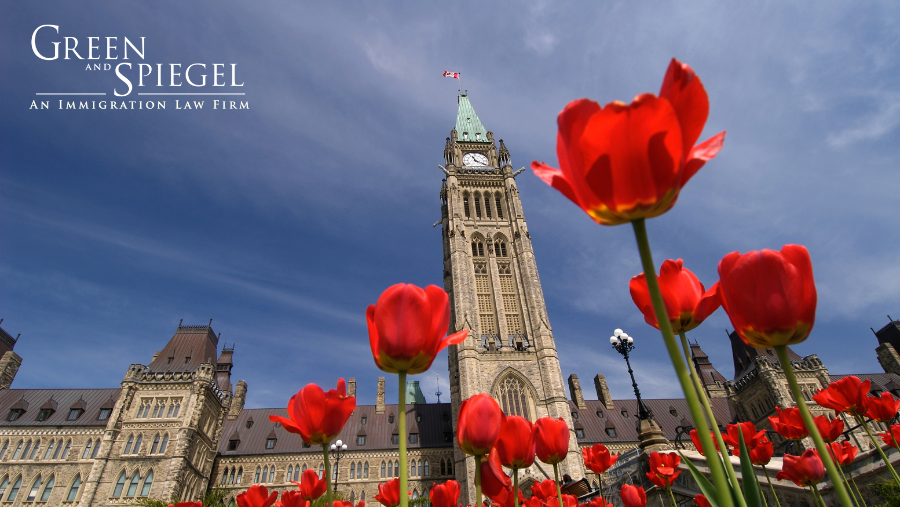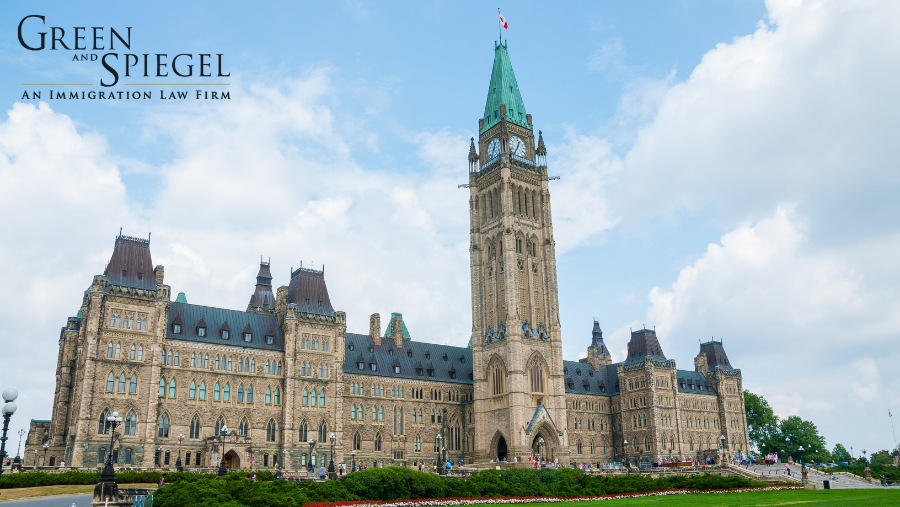
Over the past year, we have watched access to Canadian citizenship open up after the landmark ruling of Bjorkquist et al. v. Attorney General of Canada. In this landmark case, the Court found that the “second-generation cut-off” rule which limits citizenship by descent to the first generation born abroad was unconstitutional. The impact of this ruling is detailed by Green and Spiegel.
In the months following, Bill C-71, an Act to amend the Citizenship Act (2024), was introduced into the House of Commons. This bill created a way for Canadian parents born abroad, who acquired citizenship by descent, to pass their citizenship to their children born abroad.
As it is currently drafted, Bill C-71 requires the parent of a child born after its passage, to demonstrate they have a ‘substantial connection’ to Canada by having accumulated at least 1,095 days in Canada prior to the birth or adoption of their child. The bill also opens an avenue for any child born prior to the bills passage to apply for proof of their Canadian citizenship without needing to demonstrate a substantial connection to Canada.
While the Bill has yet to receive royal assent, there are understandably many questions from individuals hoping to qualify under these new rules. Green and Spiegel LLP understands these concerns and hopes to help clarify what to expect from Bill-C71, barring and substantial changes, with the following examples:
Martha is seeking advice on her son John acquiring Canadian citizenship. John is a British citizen born in the UK in 2010. Martha was born in the UK and her father, Colin, was Canadian-born. Would John be eligible for citizenship once Bill C-71 passes?
Yes. Bill C-71 proposes to remedy the currently unconstitutional “second generation cut off” by allowing those who were born outside of Canada to a Canadian parent prior to the Bill’s passage, to apply for proof of their Canadian citizenship without demonstrating a substantial connection to Canada. Martha should sign up for Green and Spiegel’s e-lerts to remain apprised of Bill C-71’s passage, and reach out to a member of the team for more information.
Tory is currently pregnant, with an expected due date in March 2025. Tory was born in Lyon, and is currently a dual French-Canadian citizen, having acquired Canadian citizenship by descent through her mother who was born in Montreal. Due to complications with her pregnancy, Tory plans to give birth in France, and is therefore seeking advice on her baby’s eligibility for Canadian citizenship. Tory has advised that she attended high school in Quebec, from 2015 to 2019. Will Tory’s baby be eligible for citizenship once Bill C-71 passes?
Yes. Bill C-71 incorporates a “substantial connection test” which requires that a foreign-born Canadian parent who acquired citizenship by descent to demonstrate that they have accumulated at least 1095 days (3 years) in Canada prior to the birth of their foreign-born child in order to pass along their Canadian citizenship. Given that Tory spent over 3 years in Canada before her baby will be born, she would likely be eligible to apply for proof of citizenship for them once the second-generation restriction is lifted.
Sarah is wondering how Bill C-71 will impact her plans to adopt twins from abroad. She estimates the adoption will be finalized in December, 2026. Both Sarah and her biological parents were born in Mexico but her grandmother, Maria was born in Toronto. Sarah’s mother has already obtained proof of her Canadian citizenship.
Growing up, Sarah would visit Maria in Toronto regularly and estimates that she has spent cumulatively, over 6 years in Canada. How would the passage of Bill C-71 impact Sarah and her prospective adopted twins?
Once Bill C-71 passes, Sarah should be able to apply for proof of her Canadian citizenship by virtue of having been born to a Canadian parent. Bill C-71 is written to apply equally to biological and adopted children, requiring the substantial connection test for Canadian adoptive parents who are also born outside the country to pass along their Canadian citizenship. Therefore, once Sarah has acquired proof of her Canadian citizenship, as she has spent more than 1095 days in Canada before the legal adoption of her twins, her twins will likely be eligible to apply for a grant of citizenship once the adoption order has been granted.
Elena has questions about the upcoming changes to the Canadian Citizenship Act pursuant to Bill C-71. Elena’s maternal grandmother was born in Canada, Elena’s mother, Laura, was born in the US and applied for proof of Canadian citizenship in 2018. Elena was born in the US in 1998. Neither Elena, nor Laura have ever lived in Canada. Would Elena be eligible for Canadian citizenship under the forthcoming amendments?
Yes. Based on the drafting of bill C-71, the substantial connection test (1095 days in Canada) does not apply retroactively and therefore does not appear to bar Elena acquiring Canadian citizenship in this scenario.
Musa is reaching out on behalf of his sister. Musa’s grandfather, Ibrahim, was born in Canada, and Musa’s father, Sayed was born abroad. Sayed did, however, live in Canada from age 17-25. Musa’s sister, Fatima, (who was also born abroad) is in the final stages for an interview for a job that requires she hold Canadian citizenship for security clearance purposes. Given that Bill C-71 has yet to pass, will she be able to acquire the required security clearances?
Given that Fatima would likely be eligible for Canadian citizenship once Bill C-71 hhas has ad has passed, she can apply under the urgent processing measures which IRCC has implemented pending the passage of Bill C-71. Under these measures, Citizenship applications may be processed under the provisions for a discretionary grant of citizenship, provided that the applicant can show their case is exceptional and requires urgent processing. Under these provisions, if approved, the grant will be effective as of the date that the citizenship oath is taken whereas, once Bill C-71 passes, citizenship rights will be applied retroactively to the applicant’s date of birth.
Navigating Canada’s complex citizenship laws can be a confusing exercise, especially given the pending changes and uncertainty regarding whether bill C-71 will be passed in its current state. As such, it is important to note that these examples are purely illustrative and are subject to any changes that occur before Bill C-71 receives royal assent. While we will provide further updates on the progress of Bill C-71 as applicable, if you would like to discuss your particular circumstance, we invite you to contact us for more information.






